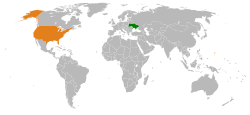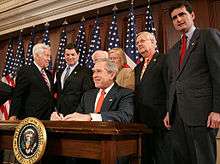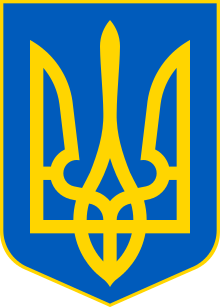Ukraine–United States relations
 | |
Ukraine |
United States |
|---|---|
Ukraine – United States relations are bilateral relations between Ukraine and the United States.
The United States officially recognized Ukrainian independence on December 25, 1991. The United States upgraded its consulate in the capital, Kyiv, to embassy status on January 21, 1992. In 2002 relations between the United States and Ukraine deteriorated after one of the recordings made during the Cassette Scandal revealed an alleged transfer of a sophisticated Ukrainian defence system to Saddam Hussein's Iraq.
The Ambassador of the United States to Ukraine is Marie L. Yovanovitch, the seventh U.S. ambassador since Ukrainian independence.
The United States supports Ukraine’s bid to join NATO despite Russia’s objections.[1]
According to documents uncovered during the United States diplomatic cables leak U.S. diplomats defend Ukrainian sovereignty in meetings with other diplomats.[2][3][4]
Despite Ukraine's close cultural and historical ties with neighboring Russia, Ukrainians have generally viewed the U.S. positively, with 80% expressing a favorable view in 2002, and 60% in 2011.[5] According to the 2012 U.S. Global Leadership Report, 33% of Ukrainians approve of U.S. leadership, with 26% disapproving and 41% uncertain.[6]
Country comparison
| Population | 42,418,235 | 326,731,000 |
| Area | 603,628 km2 (233,062 sq mi) | 9,629,091 km2 (3,717,813 sq mi) |
| Population density | 73.8/km2 (191.1/sq mi) | 31/km2 (80/sq mi) |
| Capital | Kiev | Washington, D.C. |
| Largest city | Kiev (2,900,92) | New York City – 8,363,710 (19,006,798 metro) |
| Government | Unitary semi-presidentialconstitutional republic | Federal presidential constitutional republic |
| First leader | Leonid Kravchuk | George Washington |
| Current leader | Petro Poroshenko (President) | Donald Trump (President) |
| Official languages | Ukrainian | English (de facto) |
| GDP (nominal) | $112.154 billion ($2,640 per capita) | 2016 World Bank: US$18.569 trillion ($57,467 per capita)[7] |
| Main religions | 62.5% non-Religious, 33.6% Christianity, 0.6% Islam, 3.3% Other | 75% Christianity, 20% non-Religious, 2% Judaism, 1% Buddhism, 1% Islam |
| Ethnic groups | 77.8% Ukrainians, 17.3% Russians, 0.6% Belorussians, 0.5% Moldovans, 0.5% Crimean Tatars,
0.4% Bulgarians, 0.3% Hungarians, 0.3% Romanians, 0.3% Poles, 1.7% Others/Unspecified (2001 Census) |
74% White American, 14.8% Hispanic and Latino Americans (of any race), 13.4% African American,
6.5% Some other race, 4.4% Asian American, 2.0% Two or more races, 0.68% American Indian or Alaska Native, 0.14% Native Hawaiian or Pacific Islander |
History of relations

.jpg)
The United States enjoys cordially friendly and strategic relations with Ukraine and attaches great importance to the success of Ukraine's transition to a democracy with a flourishing market economy.[8] Following a period of economic decline characterized by high inflation and a continued reliance on state controls, the Ukrainian government began taking steps in the fall of 1999 to reinvigorate economic reform that had been stalled for years due to a lack of a reform majority in the Ukrainian parliament. The Ukrainian government's stated determination to implement comprehensive economic reform is a welcome development in the eyes of the US government, and the U.S. is committed to supporting Ukraine in continuing on this path. Bilateral relations suffered a setback in September 2002 when the federal government of the U.S. announced it had authenticated a recording of President Leonid Kuchma's July 2000 decision to transfer a Kolchuga early warning system to Iraq. The Government of Ukraine denied that the transfer had occurred. Ukraine’s democratic Orange Revolution has led to closer cooperation and more open dialogue between Ukraine and the United States. U.S. policy remains centered on realizing and strengthening a democratic, prosperous, and secure Ukraine more closely integrated into Europe and Euro-Atlantic structures.
A cornerstone for the continuing partnership of the US with Ukraine and the other post-Soviet states has been the Freedom for Russia and Emerging Eurasian Democracies and Open Markets (FREEDOM) Support Act (FSA), enacted in October 1992. Ukraine has been a primary recipient of FSA assistance. Total U.S. assistance since independence has been more than $3 billion. U.S. assistance to Ukraine is targeted to promote political and economic reform and to address urgent humanitarian needs. The U.S. has consistently encouraged Ukraine's transition to a democratic society with a prosperous market-based economy.
In November 2006, the Millennium Challenge Corporation (MCC) selected Ukraine to be eligible to apply for compact assistance. Ukraine already participates in the MCC Threshold Program, and in December 2006 signed a $45 million Threshold Program agreement. This program, which began implementation in early 2007, aims to reduce corruption in the public sector through civil society monitoring and advocacy, judicial reform, increased government monitoring and enforcement of ethical and administrative standards, streamlining and enforcing regulations, and combating corruption in higher education. Ukraine is beginning the process of developing a Compact proposal, and successful implementation of the Threshold Program will be necessary before the MCC will enter into a Compact with Ukraine.
The U.S. maintains an embassy in Ukrainian capital Kiev.
Controversies
During the Ukrainian independence movement, then-President George H.W. Bush made a speech critical of the movement which has since been described as "possibly the worst speech ever by an American chief executive"[9]
On 18 February 2009 the Verkhovna Rada of Crimea sent a letter to the Cabinet of Ministers of Ukraine and the President of Ukraine in which it stated that it deemed it inexpedient to open a representative office of the United States in Crimea and it urged the Ukrainian leadership to give up this idea. The letter will also be sent to the Chairman of the UN General Assembly. The letter was passed in a 77 to 9 roll-call vote with one abstention.[10]
In 2012, the United States Senate Committee on Foreign Relations passed Resolution 466, calling for the unconditional release of political prisoner Yulia Tymoshenko and implemented a visa ban against those responsible.[11] The resolution condemned the administration of Ukrainian President Viktor Yanukovych and asked NATO to suspend all cooperative agreements with Ukraine.[12] In response, First Deputy General Prosecutor of Ukraine Renat Kuzmin wrote a letter to U.S. President Barack Obama, complaining that his visa was revoked.[13]
On June 8, 2017, an explosive device was hurled at the United States embassy in Kiev.[14]
On December 22, 2017, the U.S. agreed to supply Ukraine with more lethal weapons, including Javelin anti-tank missiles.[15] A Russian diplomat said the move will fuel the conflict in the country's east.[16]
Sister-Twinning cities












































Agreements and memorandums








































See also
References
![]()
- ↑ Biden Says U.S. Still Backs Ukraine in NATO, New York Times (July 21, 2009)
- ↑ Bandera, Stephen (1 December 2010). "Holodomor, WikiLeaks and Russia's Single Historical Space". Kyiv Post. Retrieved 13 December 2010.
- ↑ After Russian invasion of Georgia, Putin's words stir fears about Ukraine. Kyiv Post (November 30, 2010)
- ↑ WikiLeaks: Vershbow defends Ukrainian sovereignty in meeting with Russians. Kyiv Post (November 29, 2010)
- ↑ Opinion of the United States Pew Research Center
- ↑ U.S. Global Leadership Project Report - 2012 Gallup
- ↑ "GDP (current US$)". World Development Indicators. World Bank. Retrieved 1 July 2017.
- ↑ Obama confirmed support of Ukraine in a conversation with Poroshenko,112.International (29 September 2015)
- ↑ James Carafano, How to be a freedom fighter, The Washington Examiner(Washington, D.C.), (April 4, 2011).
- ↑ Crimean parliament votes against opening U.S. diplomatic post, Interfax-Ukraine (18 February 2009)
- ↑ Senate Press Release
- ↑ Kyiv Post
- ↑ Kyiv Post
- ↑ http://www.nydailynews.com/news/world/explosive-device-u-s-embassy-kiev-article-1.3230345
- ↑ AP via New York Daily News
- ↑ Washington Post
